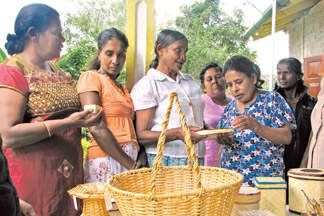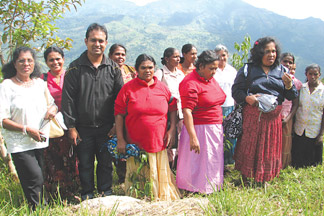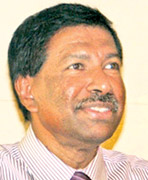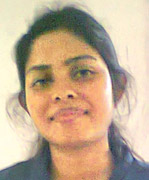Mulleriyawa 'Halfway Home' brings sunshine to its inmates
By Ranil WIJAYAPALA
 |
| The handicraft
by the inmates |
 |
| The garden
maintained by the inmates |
 |
| The visit to
hill country by the inmates and the staff |

Dr. Jayan Mendis |

Dr. Maleetha Rupasinghe |
The lush greenery and the surrounding paddy fields gives the small
cliff in Mulleriyawa, the location of the Mulleriyawa Halfway Home
sheltering around 500 hapless women who have been distanced, cornered
and sometimes neglected by their own relatives for the mere reason of
becoming a mental patient, has given a sense of security for the inmates
who thinks the normal society a distant dream for them.
Mulleriyawa Halfway Home, once famous as the Unit 2 of the now closed
Mulleriyawa Mental hospital, had been a place for those patients to have
life sentence without any access to the normal society.
The plight of these hapless inmates who had no place in the normal
society was known to many in the country, as the environment provided to
them in this unit was more of a 'subhuman' one. According to some
reports the environment prevailed there was not even suited for a
hardcore criminal.
But this unit which has undergone tremendous changes during the past
few years after it was taken under National Institute seems to be
breathing fresh air after being of Mental Health relieved of its
congested environment, and transforming into a transit point for many
female mental patients.
Now it is becoming a transit point for many of the patients who are
willing to go back to the normal society though they have no relatives
to accept them after recovering from their illnesses.
The National Institute of Mental Health (NIMH) under which the
Halfway Home Mulleriyawa is managed since 2006 has made many strides
when improving the condition of these dependent and marginalized set of
females to become independent set of citizens in the country.
The well maintained garden, the surrounding, and the wards give the
impression that it is no longer a neglected place and it is well
equipped to take care of these miserable set of females prior to their
reintegration into the society.
But they had to come through a difficult path to get this place
transformed into this situation under the directive of Dr. Jayan Mendis,
Director NIMH.
Therefore, the patients like Sitha who had been there for more than
ten years and Chamali Devika who had been there for more than five years
are now becoming a more contended set of people prior to their
integration into the society.
Dr. Maleetha Rupasinghe, one of the doctors at the hospital says that
the number of patients at the hospital has now reduced to around 500
after many adults females were taken to elders homes and the handing
over of some patients to their relatives by mental health social
workers.
"They were living under inhumane condition and some were tied to
walls and chairs. They alleged that they were beaten and there had been
fighting between patients. They were living under subhuman conditions
before it was taken over by the NIMH", she added.
The psychiatric rehabilitation hospital which had no permanent doctor
to take care of the patients has now been assigned dedicated doctors and
66 nursing staff and 77 supporting staff to look after the 498 patients.
"After this administration was changed, the director NIMH wanted to
change the condition here. Since these inmates were here for years and
years they were having medical complications and psychiatric illnesses",
she added.
"Initially the patients were reviewed by their drugs, psychiatric
conditions by the consultant medical officers. They have not been
checked by the doctors for years and years and after that only the
rehabilitation process was initiated", Dr. Maleetha added. The patients
were then categorised into three groups. Those who were with very good
functional capabilities but need motivation, other intermediate groups
who needed only rehabilitation and the acute patients who couldn't
function well at all because of psychiatric illness or their physical
disability or they were elderly.
"The people here are elderly due to their long stay here. Because of
that also we face a lot of problems because we have to care about the
elderly people rather than caring for psychiatric patients", she added.
Apart from that there are groups with learning disability and groups
with severe resistance psychiatric illness. The rehabilitation process
was initiated with patients with very good functional capabilities.
"After the categorisation the inmates with very good functional
capabilities became motivated to work and they wanted to earn something.
Initially five to six people were taken for hospital cleaning service
and it became a success. Therefore, we thought of providing them
employment outside the hospital. They had that opportunity with a
private company and initially ten people went to work there daily and
came back to the hospital", she added.
The gardening project which has been initiated with the assistance of
the Royal College of Colombo has also become an encouraging project for
the inmates. More than 15 inmates are working there at the one and half
acre land growing vegetable, and fruits.
When inmates are becoming more independent and motivated to work the
hospital authorities took initiative to allow them to lead an
independent life outside the hospital from the money they earned from
their jobs.
"We all worked together to find a rented house for these inmates
working outside and find donations to furnish it. Then those who were
employed in the cleaning service were allowed to live outside. It was
started in March 2010. The hospital is paying the rent of the home and
they are spending for their food and clothing from their earnings as
their contribution is sufficient, she added.
The second community house project was also initiated after the
success of the first project with the inmates who were employed at
another factory. " Now we have two houses and the hospital is paying the
rent for these houses", Dr. Maleetha added.
With the improvement of the condition of these patients, many more
inmates can be sent for employment and can be allowed to stay in these
community houses. The inmates are sharing these houses and collect a
fund for their foods and make their meals without depending on the meals
provided by them.
What the hospital authority needs is the support of the private
sector companies to find them more job opportunities and to find them
community houses to accommodate them to lead an independent life.
The domestic aid project which was initiated in 2011 also allows the
people who are willing to take care of the patients to act like guardian
families. "We bring both parties together and sign an agreement with the
involvement of the Legal officer and the Human Rights Commission. The
patients who are willing to work in houses as domestic aids can get
employment under this project", she added.
The inmates, according to their wish, can be employed as domestic
aids under this project and the guardian family has to deposit money in
their savings account, according to the agreement they signed with the
hospital authorities.
When these inmates are employed outside the hospital many others are
undergoing different kinds of the vocational training at the hospital.
Madam Shiranthi Rajapaksa who had visited the Mulleriyawa Halfway Home
has donated the vocational training centre enabling them to undergo
vocational training there.
"The Occupational Therapy Department is playing a yeoman service and
they take different people and provide them training in different
vocational activities", she added.
The making of tea bags for tea company and cane craft other ornaments
under the guidance of the trainers from the National Craft Council has
made a big difference in their lives.
"Through this project their capabilities are recognised and they have
their right to lead a normal life though they are living in the
hospital. We are trying to facilitate that process as much as possible
to allow them to go on outings and buy their things," Dr. Malitha added.
Giving them the impression that they are no longer an isolated and
dependent set of people the hospital authorities have decided to allow
them to cook their own meals at the hospital.
"Though they were provided food like any other patients in hospitals
after the categorization of patients, we thought that they can cook
their meals themselves to give them the feeling that they feel are
cooking their meal", she added.
"Through this activity, what we wanted was to make this hospital a
more homely one for them. Therefore, the kitchen project was started in
four rehabilitation wards and all four rehabilitation wards were
provided with pantry. Now they are cooking their meals themselves", Dr.
Malitha added.
"To make this hospital a more homely one, we are celebrating all the
festivals like New Year, Aluth Avurudu, Christmas, International Womens
Day and Mental Health Day.
According to Shamali Devika who is employed with the cleaning
service, she is earning more than Rs. 10,000 salary per month from her
job and earning additional amount from sewing and other craft work she
engaged at the Occupational Therapy Department.
She is happy to reunite with her brother who is now living in Matara.
"I love to go back home but I feel I am still sick. But now I earn my
living by doing this job", she added.
Sitha is also happy with her work and earn some money required for
her needs. "We can spend for our soaps, tooth paste, tea and sugar from
these earnings. Other things are provided by the hospital", she added.
According to Buddhika Ranasinghe, an Occupational Therapist at the
hospital, the National Craft Council is helping them to train the
inmates in different vocations and many private sector companies are
working in partnership with them to purchase the handicraft the inmates
produce there.
"They are exposed to the normal society, step by step, through these
project as we take them even on trips with their earnings from these
work", Buddhika added.
The Director NIMH Dr. Jayan Mendis says that they are planning to
transform this place into a long-term rehabilitation centre for the
mental patients in the Western province.
"We have to rehabilitate these patients as well as look after the
elderly patients who are in need of urinals, bed pans, pampers, wheel
chairs, physiotherapy equipment and so many other requirement.
We seek the assistance of the donors and the general public to look
after these patients in their old age", he added.
It is the fervent hope of the hospital authorities to make this place
a better one for its inmates and a place which can transform them to
more independent and strong women, like any other women in the society. |

